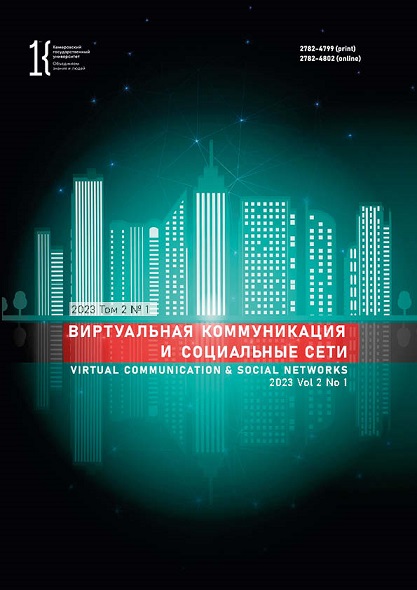Barnaul, Russian Federation
Linguistics of response is a branch of dialog studies that focuses on response lines as part of a conversation, including conditions needed to implement the commenting intent in a virtual dialogue. According to the hypothesis, virtual commenting occurs when the initial line falls into the sphere of modus reflection of the native speaker. This condition realizes itself when the native speaker makes the decision to comment on an event. Modus reflection is a manifestation of the native speaker’s emotional and evaluative attitude to the original message. In this case, modus reflection appears as a metalinguistic activity. The descriptive analysis involved 614 response comments to an online news article entitled Subway Crossings: Street Gangs Where Flower Stalls Should Be. The research revealed three conditions when the commenting intent is realized in an online dialog: the initial line falls into the mode of agreement; the initial line falls into the mode of disagreement; the initial line falls into the neutral mode.
virtual dialogue, comment intention, linguistics of response, modus reflection, responding remark
1. Afinogenova V. A. Functioning of illocutionary in speech interaction. Bulletin of the Moscow Region State University, 2019, (3): 107–118. (In Russ.) https://doi.org/10.18384/2224-0209-2019-3-971 EDN: https://elibrary.ru/ONMODA
2. Baranov A. N., Kreydlin G. E. Illocutionary compulsion in the structure of a dialogue. Voprosy Jazykoznanija, 1992, (2): 84–99. (In Russ.) https://www.elibrary.ru/ogjrpf
3. Belova N. S. Types of responding remarks as part of a dialogic unity with a negative question in French and Italian. Cand. Philol. Sci. Diss. Moscow, 2010, 179. (In Russ.) https://www.elibrary.ru/qfaxtb
4. Bochkarev A. I. Communicative conditions of indirect speech acts realization. Proceedings of Tula State University. Humanitarian sciences, 2012, (3): 503–510. (In Russ.) https://www.elibrary.ru/pwijrd
5. Galichkina E. N. Specifics of computer discourse in English and Russian in the genre of computer conferences. Cand. Philol. Sci. Diss. Astrakhan, 2001, 212. (In Russ.) https://www.elibrary.ru/nlxndb
6. Golev N. D., Kim L. G. Dictum-modus pluralism in virtual dialogic discourse (based on Internet comments). Media Linguistics, 2023, 10(1): 4–26. (In Russ.) https://doi.org/10.21638/spbu22.2023.101 EDN: https://elibrary.ru/VNEUSS
7. Grays G. P. Logic and speech communication. Novoe v zarubezhnoj lingvistike, 1985, (16): 217–238. (In Russ.)
8. Zavyalova Z. S. Real and virtual sudes of self on the internet: In interaction model. Tomsk State University Journal, 2011, (343): 45–47. (In Russ.) https://www.elibrary.ru/negrbx
9. Karyagina N. F. Perlocutionary semantics of responding remarks in contemporary French drama. Cand. Philol. Sci. Diss. Moscow, 2002, 220. (In Russ.) https://www.elibrary.ru/qdscmd
10. Kim L. G. Conflict of text interpretations as a consequence of cognitive dissonance in internet disputes. Virtual Communication and Social Networks, 2023, 2(4): 222–228. (In Russ.) https://doi.org/10.21603/2782-4799-2023-2-4-222-228 EDN: https://elibrary.ru/OBGWTE
11. Kolokoltseva T. N. Dialogues in Internet communication. Ivzestia of the Volgograd State Pedagogical University, 2011, (8): 128–133. (In Russ.) https://www.elibrary.ru/ooarsb
12. Nikolaev A. S., Frolova O. V., Gorodnyi V. A., Lyakso E. E. Features of responses of 5–11 year old children with autism spectrum disorders in dialogues with adults. Journal of Psycholinguistics, 2019, (4): 92–105. (In Russ.) https://doi.org/10.30982/2077-5911-2019-42-4-94-107 EDN: https://elibrary.ru/KDYEGB
13. Orgoňová O., Kozharnovic M. P. Dialogue in Slovak social networks. Media Linguistics, 2022, 9(3): 237–253. (In Russ.) https://doi.org/10.21638/spbu22.2022.305 EDN: https://elibrary.ru/YALOYU
14. Paducheva E. V. Pragmatic aspects of the coherence of a dialogue. The Bulletin of the Russian Academy of Sciences: Studies in Literature and Language, 1982, 41(4): 305–313. (In Russ.)
15. Radina N. K. Intent analysis of online discussions (based the example of comments on the materials of the internet portal InoSMI.ru). Mediascope, 2016, (4). (In Russ.) URL: http://www.mediascope.ru/2238 (accessed 10 Oct 2023). https://www.elibrary.ru/yhcxkn
16. Slabodkina T. A. Specific character of planning responses in dialogues of 10–12 years old native Russian speaking children. Rheme, 2020a, (3): 43–52. (In Russ.) https://doi.org/10.31862/2500-2953-2020-3-43-52 EDN: https://elibrary.ru/CRFHOR
17. Slabodkina T. A. A comparative analysis of speech disfluencies in children aged 10–12 years and adults, native Russian speakers. Journal of Psycholinguistics, 2020b, (4): 91–101. (In Russ.) https://doi.org/10.30982/2077-5911-2020-46-4-91-101 EDN: https://elibrary.ru/XCFGZK
18. Smetyuk I. N. Dialogic text: Communicative and Linguistic aspects in English and Russian. Cand. Philol. Sci. Diss. Abstr. Perm, 1994, 20. (In Russ.) EDN: https://elibrary.ru/ZJGNAL
19. Timina M. V. Experience in using the extended methodology of intent analysis in the process of training information specialists. Proceedings of the St. Petersburg State University of Culture and Arts, 2013, 197: 83–88. (In Russ.) https://www.elibrary.ru/rcfunh
20. Ushakova T. N., Pavlova N. D., Latynov V. V., Tseptsov V. A., Alekseev K. I. The word in action: Intent analysis of political discourse. Moscow: Aleteiya, 2000, 320. (In Russ.) https://www.elibrary.ru/qxxcnr
21. Sharonov I. A. Communicatives in real and fiction dialogues. Ecology of language and communicative practice, 2017, (3): 114–127. (In Russ.) https://www.elibrary.ru/ymtrpk
22. Shpilnaya N. N. Dialogical text: derivational concept. Moscow: URSS, 2018, 384. (In Russ.)
23. Shpilnaya N. N., Moiseeva V. A., Voronets M. V. Implementation of replication intentions in dialogue (experimental study). Vestnik of the Mari State University, 2021, 15(3): 375–383. (In Russ.) https://doi.org/10.30914/2072-6783-2021-15-3-375-383 EDN: https://elibrary.ru/IEPQKB
24. Heritage J. Conversation analysis as social theory. The new Blackwell companion to social theory, ed. Turner B. S. Oxford, UK: Blackwell, 2008, 300–320.
25. Psathas G. Conversation analysis: the study of Talk-in-Interaction. Thousand Oaks: Sage, 1995, 85.


















